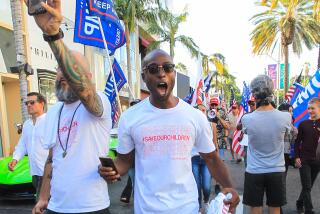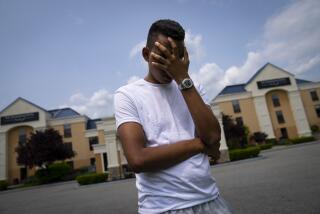Judge to Let Moussaoui Represent Self at Trial
- Share via
ALEXANDRIA, Va. — A federal judge on Thursday grudgingly allowed accused terrorist Zacarias Moussaoui to represent himself at his upcoming conspiracy trial, but an upset Moussaoui demanded to be freed from prison immediately because he says authorities are wrongfully trying to implicate him in the Sept. 11 hijackings.
Moussaoui, declared mentally competent moments earlier by U.S. District Judge Leonie Brinkema, told a packed federal courtroom he has “secret evidence” showing that authorities on both sides of the Atlantic have been trailing him for years.
“I have physical evidence that the government was monitoring my movements since I entered the United States of America.... They knew I was not in contact with these people who are supposed to have done the hijacking,” he said.
Moussaoui, the only person charged in the United States as part of the Sept. 11 conspiracy, insisted on giving a street address in London where he said armed British police raided his home in 1998. That address alone, Moussaoui said, should be enough to “see me leaving the jail today.”
The defendant was so adamant about giving the London address, spelling the street and coming back to it several times, that FBI agents in the courtroom had it checked out to make sure it was not a coded message to outside terrorists, according to a law enforcement source who asked not to be identified. The address appeared to match an address where he had actually lived.
Authorities suspect Moussaoui was slated to be the “20th hijacker” had he not been jailed in Minneapolis last summer on an immigration violation after he acted suspiciously at a flight training school. Although prosecutors have not alleged that Moussaoui had any direct contact with the 19 hijackers, they say his activities--in attending flight training school and receiving a $14,000 wire transfer from a suspected terrorist--mirrored those of the Sept. 11 terrorists.
Moussaoui’s latest dramatic court appearance included none of the violent invective that marked an earlier diatribe in April, when he stunned the courtroom by calling for the destruction of America and Jews everywhere.
But in his dialogue with Brinkema on Thursday, Moussaoui ratcheted up his charges that the government--and his former defense attorneys--were conspiring to have him killed. He said that is why he wants to defend himself, perhaps with help from an unidentified Muslim lawyer who contacted him a few months ago.
“My life is at risk and I will never compromise it,” Moussaoui said. “My life is very precious to me, it is given by God, and I will not play with it.”
Former defense attorney Frank Dunham Jr., who was relegated to the role of “standby” counsel midway through the hearing after the judge ruled that Moussaoui could represent himself, told reporters that the defendant’s conspiracy theory is the “rambling” of a disturbed man.
Dunham and colleagues on the former defense team said Moussaoui’s conspiracy defense was news to them.
“If you try to figure out the significance of anything he said, you’re wasting your time,” Dunham said. Calling Moussaoui’s decision to be his own lawyer “a disaster,” he added: “There’s no way he can get a fair trial representing himself.”
The judge herself told Moussaoui--who is not a lawyer but says he received a master’s degree in business in England--that she thought his decision was unwise. “You make a bad situation more difficult,” Brinkema said.
Among a host of potential problems cited by the judge and attorneys in the case, Moussaoui will likely be denied access to sensitive national security material that would normally be reviewed by defense attorneys, and it could take him months to prepare for a trial tentatively scheduled to start at the end of September. Moussaoui agreed to accept a computer at the jail to prepare for the case only after the judge assured him that his former attorneys will not set it up.
Nonetheless, the judge said that, based in part on a psychological evaluation and the observations of Moussaoui’s jailers in Alexandria, she believes he is mentally competent to represent himself. She then asked Moussaoui whether he understands how serious the charges against him are and that several counts carry a mandatory sentence of life in prison without parole, or the death penalty.
“I understand fully the gravity of the charges,” Moussaoui said in a clipped French accent. “I understand fully the U.S. system of justice, and [if convicted] I will never see the light again.”
Brinkema concluded that, although Moussaoui’s decision is clearly unorthodox, “I’m satisfied that you understand what you are doing by waiving your right to counsel.”
The judge was reluctant to let Moussaoui delve into his proclamations of innocence, cutting him off repeatedly as he began making cryptic allegations about the “secret evidence” against him.
“You’ve won your motion. That’s the end of it,” Brinkema said.
But Moussaoui insisted that the judge was trying to “censure” him, saying he could prove his case in just 10 minutes. Ultimately the judge gave him a few minutes to expand on his theory.
In discussing the government surveillance against him, he referred several times to a police raid at his home in London.
A spokesman for Scotland Yard declined to discuss any intelligence that may or may not have been gathered on Moussaoui. The spokesman did say, however, that on Jan. 29, 1999, uniformed police went to the address to follow up on a public complaint against a man believed to be in possession of a firearm who reportedly entered the apartment.
“There was no one on the premises fitting the description given and no one was found to be in possession of a firearm. No arrests were made,” the spokesman said. He would not say whether Moussaoui was linked to the incident.
Moussaoui also appeared to suggest he was the victim of mistaken identity and that another man at the Minnesota flight school was the one involved in the hijackings.
The judge said the issue was irrelevant to the motions she was hearing and that Moussaoui could explore the question later. He vowed to bring an “emergency motion” to have himself freed so he could leave jail as soon as Thursday.
His mother sat in the second row in traditional Muslim headdress. The emotional Aicha Moussaoui, who lives in France, stood up as her son entered the courtroom in prison garb and met with him afterward in private for the first time since his imprisonment. “He will always be my son,” she told reporters later in French.
Meanwhile, Pakistan officials confirmed that they have detained several U.S. citizens in recent weeks, but they downplayed any Al Qaeda or Taliban connections. Two Afghans who apparently have U.S. citizenship were taken into custody Wednesday on charges of illegally crossing the frontier, officials said.
However, law enforcement officials in the Northwest Frontier Province said the arrests occurred Tuesday in the South Waziristan agency and that only one of those detained had a U.S. passport. The authorities there released no identities of the detained individuals but said they appeared to have no links with the Taliban or Al Qaeda.
Instead, officials said, the men had served with the Northern Alliance, which fought the Taliban and Al Qaeda, and were believed to be on a mission to recruit local tribesmen for the new Afghan army.
*
Times staff writers Josh Meyer in Washington, Marjorie Miller in London and Tyler Marshall in Pakistan contributed to this report.
More to Read
Sign up for Essential California
The most important California stories and recommendations in your inbox every morning.
You may occasionally receive promotional content from the Los Angeles Times.













